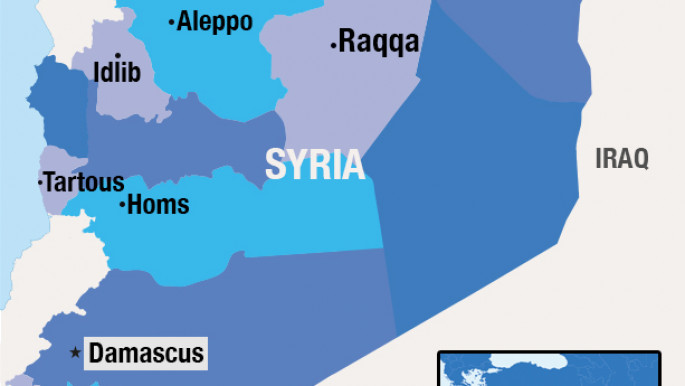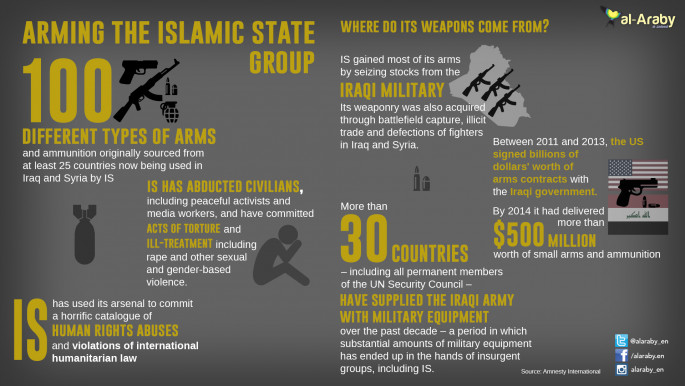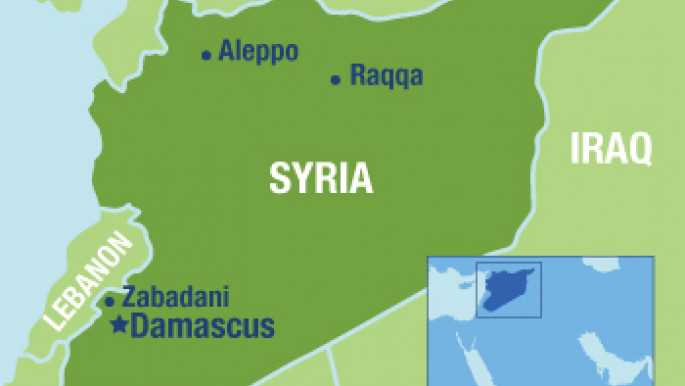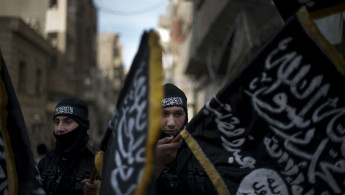A reluctant friendship: Syria's rebels and al-Qaeda's local franchise
An ideological clash between moderate rebel groups and the Nusra Front, al-Qaeda's Syrian affiliate, has turned violent - and both movements are engaged in an existential battle for Syria's future.
It will decide whether Syria's future is democratic and inclusive, or remains closed and totalitarian.
Firefights between Free Syrian Army regiments and Nusra Front fighters are nothing new, but the recent rivalries come at a critical time.
Rebels of all political persuasions are under attack from Islamic State group extremists and heavy Russian and regime bombing, although in opposition-held areas the situation can be even more complicated.
In some parts of the country, such as Latakia, months of Russian bombing look to be paying off for Moscow, and regime forces and their allied militias are winning territory from FSA-linked opposition militias.
Meanwhile, in Daraa province, pro-Damascus media report that Free Syrian Army fighters have been ordered to concentrate attacks on Nusra, and not the regime.
In Idlib, activists have been under attack from Jaish al-Fatah militants, which are said to be embedded with - and slowly taken over by - Nusra and other extremist groups.
Five years of fighting in Syria have taken their toll in civilian areas, and intense bombing, starvation sieges, and regime massacres have seen off much of the joy and synergy of the revolution's happier days.
For many civilians living in bombed out Syrian rebel territories, it is circumstance alone that has made the al-Qaeda franchise a necessary and tolerated evil.
The Nusra Front has been behind almost every major successful rebel push over the past two years of fighting - and few question the group's determination is successfully defending rebel villages from regime militias.
Part of Nusra's popularity comes from the earlier years of the group, under the military and religious guidance of Abu Maria al-Qahtani.
He and other leaders appeared determined to avoid the mistakes of al-Qaeda in his native Iraq during the insurgency against the combined forces of the US and Baghdad.
They have done this by working with other rebel groups against the main enemy, Bashar al-Assad, and generally staying out of locals' lives.
To some extend it has worked. Syrians admired the fighters for their bravery and discipline, and knew the al-Qaeda affiliate offered them the best chance of survival when massacres of rebel villages were frequent.
Conversely, rival jihadi outfit the Islamic State group ruled exclusively by the sword - and is therefore always wary of rebellion in its Syrian territories.
Crushing activism
Nusra has continued to leave a "light footprint" in areas in controls, but under Abu Mohammed al-Joulani the group is beginning to reveal its true totalitarian face.
This has been seen in Idlib province, and the targets of the group are usually secular and pro-democracy activists.
On 10 January, Nusra fighters entered an opposition media office in Kafrnabel, Idlib province - a city known as the heart of the revolution and where the "secular" revolutionary flag is still said to be prevalent.
There they kidnapped two well-known activists for crimes such as broadcasting music on Radio Fresh.
Al-Qaeda fighters taking part in the "arrest" reportedly made their disdain for civic activism known, insulting symbols of the revolution such as the pre-Baathist flag.
Hours later, the pair were released, which some believe was due to public pressure, as their radio shows provide invaluable news on bombings, bread prices, and other important civil matters.
Others disagree and believe Idlib is no longer a safe place for anti-regime activists to operate.
 |
"I don't think they would care about the public. [Their release] could be because someone Hadi [one of those kidnapped] knows helped them," a member of the Kafranbel Syrian Revolution media group told The New Arab.
"Activists in Idlib must be cautious with Nusra in control. They have targeted the Free Syrian Army in the first place for being too secular and destroyed the large Syrian Martyrs' Brigade."
Nusra has always detested the "secular" strands running through Syrian anti-Assad activism, even if it wasn't at first known.
Although the black "shahada" banner once flew alongside the pre-Baathist Syrian flag during anti-regime demonstrations, their members were said to have hated the music, dancing and people power of the early days of the uprising.
Nusra feared that this energy and power was being used to strengthen liberal-left, secular and democratic strands of the anti-Assad opposition.
In 2011, Free Syrian Army brigades began to take control of Syria as Assad's army fled, and it appeared that the Arab Spring was a victory for progressives and the left, over reactionary totalitarian forces.
"Things changed as Nusra abducted many activists and journalists. Some people accuse them of assassinating leaders from other fighting brigades," the Kafranbel media group's spokesperson said.
Nusra has also been one of the main beneficaries of regime brutality, and rebel leaders from other moderate Islamist factions have been killed off in succession in recent months, giving the group even greater control in opposition areas.
 |
| [Click to enlarge] |
Aleppo withdrawal
In Aleppo, despite a withdrawal by Nusra last year, the group is said to retain some influence in the province through extremist elements of northern rebel alliance, Ahrar al-Sham.
| Read more: Dozens killed as Islamist Syrian rebels reconcile with al-Qaeda affiliate |
Nusra withdrew suddenly from the Aleppo front to Idlib last year, when Turkey began air raids on IS and looked set to implement a "safe zone" in northern Syria.
Although Nusra was also at war with IS, it rejected any collusion with foreign powers, particularly the US-led anti-IS air armada.
The Nusra fighters' rapid exit left rebel lines in disarray, allowing IS to launch a successful offensive which nearly killed off rebel groups in parts of Aleppo province.
"Nusra doesn't really have a presence in Aleppo, but people do fear them," said Aleppo-based journalist Rami Jarrah.
"In Aleppo, they do things secretly, but in Idlib they do it openly."
After Nusra's disengagement from the province benefited IS, many rebel fighters and residents in Aleppo are afraid that the al-Qaeda affiliate might eventually make peace with IS.
Jarrah said that some members of Nusra's leadership have been allegedly caught communicating with IS.
Its actions in Aleppo would suggest it has no qualms about creating divisions within the Ahrar ranks.
In July, a double suicide bombing killed much of Ahrar al-Sham's leadership shortly after a senior member of the group denied any link to al-Qaeda in a Washington Post opinion piece.
Although Nusra is just one of many possible culprits - IS being a key suspect - many suspected some form of al-Qaeda involvement, and suicide bombings do fit with their usual method of assassination.
Ahrar al-Sham's ranks are said to be split between pro-al-Qaeda currents and those who would like to align with the Free Syrian Army.
The latter appears to be in ascendency after July's bombing ironically wiped out much of the hard-line faction's leadership.
But these divisions came to the surface during the opposition talks in Riyadh, last December, when anti-Assad groups met to discuss a common strategy for peace talks with the regime.
Ahrar al-Sham pulled out of an opposition agreement - but then reportedly re-entered, arguably after several Gulf states stepped in to persuade them of the deal's merits.
Nusra, meanwhile, rejected the talks - accusing rebel groups who took part in the talks of "treason", indicating that some in the Ahrar al-Sham negotiating team could be taking "advice" from al-Qaeda.
 |
Rise in Idlib
Nusra's alleged takeover of Jaish al-Fatah in the rebel stronghold of Idlib province - which Ahrar al-Sham are part of - would give the group innumerable benefits.
The al-Qaeda affiliate could retain its anti-Western image while obtaining arms through the opposition umbrella from outside parties.
It would also give it some leverage in opposition talks, and allow it to strengthen its hold inside Syria.
Moderate rebels have been desperate for TOW anti-tank rockets and shoulder-launched surface-to-air missiles, not only to protect opposition areas and push against regime advances, but also to boost their independence from other, more extreme, factions.
"The hope is that Ahrar al-Sham will represent the principles of the revolution rather than Islamic ones," said Jarrar.
"The worry is that [priorities] could shift due to the pressures of Nusra and the fact that external support is not something they can count on."
Even if the moderate wing of Ahrar al-Sham takes full control of the alliance, it faces continued threats from the al-Qaeda franchise.
Nusra's control of Idlib province to the south means that if Jaish al-Fatah pulled its support for the Aleppo rebels, opposition neighbourhoods would be surrounded by the regime, al-Qaeda, IS, and hostile Kurdish militias.
It would cut off the rebels from supplies and essentially kill the revolution in the northern city.
"Nusra wants to punish those in the opposition who oppose it or support the Free Syrian Army," said Jarrah. "It does this by withdrawing from the frontlines [to] allow the regime to extend itself into Aleppo or Idlib. This would send a clear message out that 'we [Nusra] are the ones actually fighting'," he added.
It is why Ahrar al-Sham's leadership might be wary of rattling the extremists or getting too visibly close to the FSA.
Nusra already killed off the Hazm Movement, a secular FSA-linked brigade in Idlib and Aleppo - so the threat is not an empty one.
"They worry if [war happens] Qatar and Saudi will not help out… and will sit back like they have done every other time."
War in the south
Does Nusra's rise in Idlib mean that the FSA and pro-democracy rebel groups are dead, as many critics - including Joulani - have claimed?
The FSA's Southern Front alliance say no - and that they are keeping Daraa province free from religious and regime extremists alike.
Nusra has a presence there, and is backed by the allied Harakat al-Muthana brigade.
Southern Front fighters have clashed a number of times with the al-Qaeda-linked fighters in recent months, and tensions have been on the rise, leading to fears of a potential intra-rebel war.
|
|
|
| Southern Front rebels [Orient news] |
Elements within the Southern Front insist they are fighting for democratic values, and its vision of a post-Assad Syria includes all religious denominations - unlike Nusra, which has forcibly converted minority groups such as the Druze.
"The Southern Front has a clear policy and principles since its formation to its present, most important of which is the return of Syria to its people," said Baraa, a
media representative for the Fallujah Houran Brigade, which is tied to the Southern Front.
Baraa added that the Southern Front does not cooperate with groups that do not believe in democracy - including Nusra - even if they have fought in battle together.
"The Southern Front is a Syrian military formation, which is open to join under the political vision and principles chosen by Syrians, and not for any other aims," Baraa added.
He said that, unlike Nusra, there were no foreigners among the Southern Front's 30,000 fighters - a tacit sign that the group has no jihadi links.
The group also wants Nusra militants to abandon the group and join the FSA.
"The Southern Front has always invited Syrian fighters from Nusra to abandon al-Qaeda, to avoid being caught in terrorist and extremist slogans, and to become part of a Syrian national project that serves Syrians and their hopes for freedom."
'Third way' threat
Nusra is also concerned with a right-wing rival in Daraa province.
The Yarmouk Martyrs' Brigade is believed to be loyal to IS and highlights the complex rivalries within Syria's jihadi camp.
Since Nusra was wiped out in eastern Syria by the Islamic State group, Nusra has been wary about IS - another al-Qaeda offshoot, but one which has disavowed its parent - doing the same again through local proxies.
Nusra was the first rebel group to link Yarmouk Martyrs' Brigade to IS, and has led an offensive on the largely isolated militia. This culiminated in the death of the group's leader - again in a suicide attack, and again attributed to Nusra.
Nusra is said to be wary of so called "third way" jihadi wings operating in opposition territories. These militias often hold more extreme ideological views than Nusra, enforce Sharia more vigoriously, reject war against IS - except in self-defence - and often have a larger number of foreign fighters among their ranks.
Nusra suspects that some of these groups could be IS sleeper cells, waiting for an order for a clandestine takeover of opposition territories, as happened in 2014.
"Nusra are trying to frame themselves as more reasonable, but even then it's still too extreme in the end," said Aymenn al-Tamimi, a Syria researcher.
"I think one way to look at it is through the Jaish al-Fatah lens. It's clear, over time, that Jaish al-Fatah has become more hard-line in its pronouncements, and this is due to Nusra's influence."
However, he believes that Jaish al-Fatah's recent pronouncements calling for foreign fighters and rejecting democracy are likely to have come from "third way" elements - and not Nusra.
Yet revolutionaries are sceptical, and believe these policies fit with the al-Qaeda ethos. Activists have witnessed the violent suppression of this cause first-hand in Idlib and in other parts of the country.
Yet many also understand Nusra is often vital to protecting rebel areas from greater threats such as IS and regime militias, which is why it is sometimes reluctantly tolerated.
But few deny that the al-Qaeda affiliate is an outfit as authoritarian as the Islamic State group, and many are waiting for the moment Nusra wipes out liberal elements.
"Ultimately Nusra's ideology dictates clamping down on these activities," said Tamimi. "It's just a matter of when, not if."
Follow Paul McLoughlin on Twitter: @pmcloughlin9



